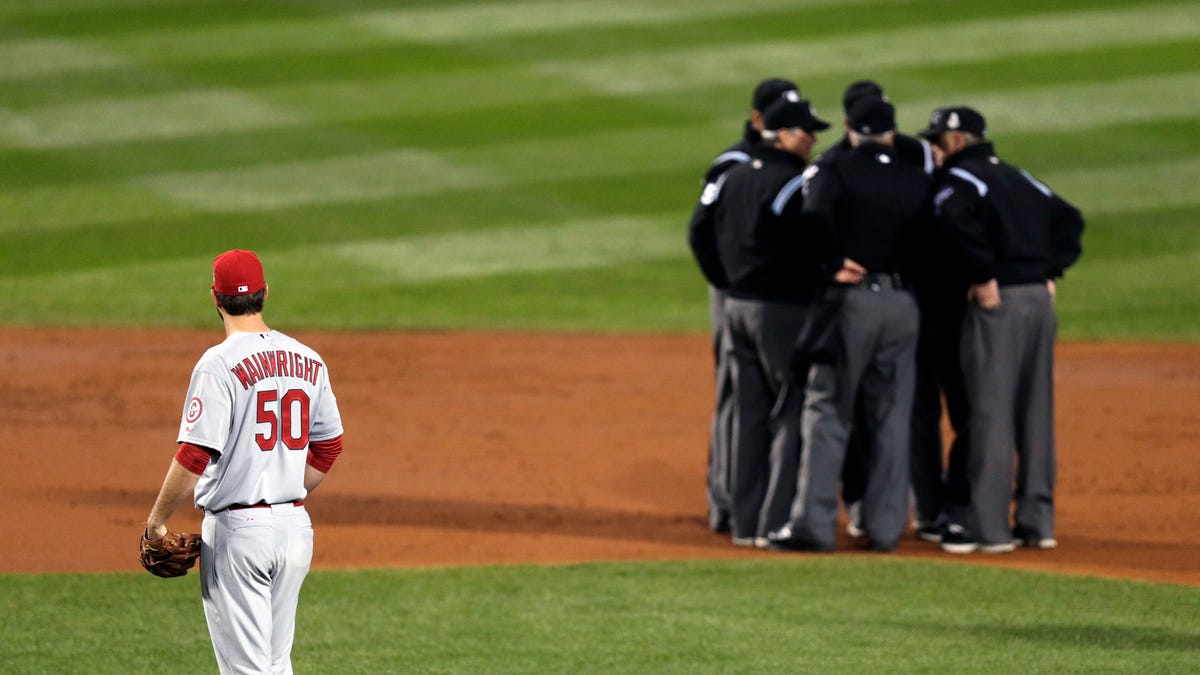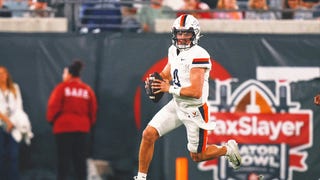
FILE - In this Oct. 23, 2013, file photo, St. Louis Cardinals starting pitcher Adam Wainwright watches as umpires discuss a ruling during the first inning of Game 1 of baseball's World Series against the Boston Red Sox in Boston. Major League Baseball announced Thursday, Jan. 16, 2014, that it will greatly expand instant replay to review close calls starting this season. Each manager will be allowed to challenge at least one call per game. If he's right, he gets another challenge. After the seventh inning, a crew chief can request a review on his own. (AP Photo/Charles Krupa, File) (The Associated Press)
Come Sunday, NFL fans might see coaches Bill Belichick or Jim Harbaugh hollering at the referee and throwing a red flag on the field to challenge a call.
And this week at the Australian Open, players will contest rulings and then watch the results be revealed on the scoreboard.
Major League Baseball made sweeping changes this week to expand its instant replay system, but the review process won't appear nearly so dramatic.
A look at how increased replay will affect baseball for players, managers, umpires and fans:
___
THE CHALLENGE OF THE CHALLENGE: Two outs, none on, scoreless game in the bottom of the second. Batter hits a chopper in the hole, seems to beat the throw but is called out. Should his manager ask for a review? If he's wrong, he won't have any options later when his center fielder makes a diving catch with the bases loaded and the umps say the ball bounced. Or does the manager go on a fishing expedition, talking to the ump to gauge if he has a case — and giving someone in the clubhouse more time to examine replays.
__
MINUTE MEN: NFL fans holler when a ref goes under the hood to review a play. Tennis crowds gaze at the scoreboard, clapping as an animated ball plops on the line to settle an in-or-out dispute. MLB figures it'll take up to 90 seconds to get the word from its New York studio. So what will fans do? Boo slow-motion replays on the Jumbotron? Hear the "Jeopardy!" theme on the PA? In other sports, the whole thing becomes an event. In baseball, we'll find out. Tigers star pitcher Justin Verlander tweeted he's eager to see how the expanded goes: "Can't say yet if I'm for or against. I like the replays on big screen tho."
___
BYE-BYE BEEFS: Face it, the spectacle of a manager charging from the dugout, flapping his arms and shouting nose-to-nose at an umpire is part of baseball lore. Will replay make wild rhubarbs a thing of the past? Well, rulings that get reviewed can't be argued. But Mike Scioscia isn't going to be happy when Mike Trout is called out at second on a neighborhood play — those can't be protested, either. Plus, a manager who's out of challenges might still want to give the umps an earful. Overall, we'll discover how this affects the rhythm and flow of the game.
___
HEAR AND THERE: To contest a call, a manager simply tells the crew chief in "timely" fashion he wants a review. At least one other ump joins the chief and they go to a designated area near home plate, picking up a headset linked to the replay command center. They can't see a video monitor, and the replay official makes the call — the NHL does it in the same manner. But as one umpire told The Associated Press: "The microphone works both ways, so on field can give input and explanation."
___
WHAT IF?: No doubt, fans in Detroit and St. Louis wish this had all happened sooner. Armando Galarraga would've had his perfect game for the Tigers, the Cardinals might've won the 1985 World Series. And what about Johan Santana's no-hitter in 2012, the only one in Mets history? Carlos Beltran's shot down the third-base line nicked the chalk just beyond the bag but was ruled foul. Fair-or-foul calls in the outfield can now be challenged, though Beltran's ball touched down in front of the umpire and likely wouldn't have been subject to appeal.
___
C'MON UMP, THAT PITCH WAS LOW!: MLB has been adamant that no matter what, replay would never be used to call balls and strikes. Never. Too hard to tell on tape whether an 88 mph slider clipped the corner, many say. But with technology improving by the instant, is it impossible to imagine someday? Stay tuned.








































